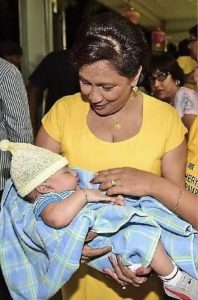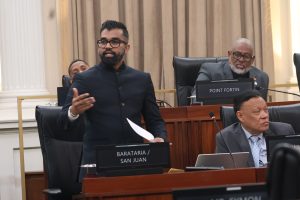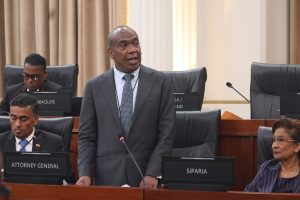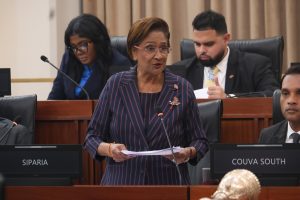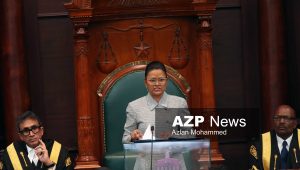‘Undoubtedly, during the past 50 years, the involvement in politics has seriously damaged working class unity’
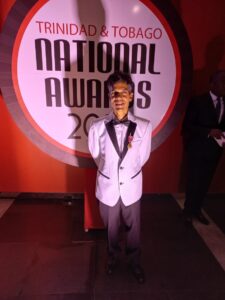
IN Trinidad and Tobago, the disenchantment from workers is largely a result of a new generation of union members who are more educated and less tolerant of myopic leadership.
Divisions among labour leaders only serve to contribute to the loss of faith in trade unions. Developments as the denationalisation of the economy as a result of privatisation of nationally-owned enterprises could only occur when working class unity is weak or absent.
Fifty years ago it would be easy to identify a trade unionist as belonging to the Left or being branded a Socialist, Marxist or Communist. The question that all trade unionists in the Caribbean and Latin America need to ask themselves- what is my ideology? Is it a wishy-washy ideology or a progressive ideology? Am I part of the proletariat or am I member of the bourgeois? Am I a closet capitalist who secretly hates the working class? Or am I living in denial because I have already adopted middle and upper class values? Some trade unionists are ashamed to be publicly identified as ‘working class’.
There is need to create a working class ideology that is relevant to a progressive labour movement in Trinidad and Tobago. This unique ideology will serve to unite the working class and also create a better Caribbean society. This ideology can have elements of socialism or Marxism but it must be tailored and structured for our small, plural society and developing economy. The working class often fail to realise that a union’s ideological stance will determine the nature of their radicalism, the respect they receive and progress. Trade unions need to adopt and maintain an ideological stance. They cannot and should not compromise their values.
In 1998, two unions representing bank workers merged- the Bank and General Workers Union and the Bank Employees Union. This was a good sign for working class unity and maybe other unions might want to follow this path to strengthen their representation at the bargaining table. Not all unions are fortunate and a few years ago, the Public Services Association (PSA) suffered a setback when some its doctors decided to leave and form the Medical Professionals Association of Trinidad and Tobago (MPATT) which was registered in 2002.
Undoubtedly, during the past 50 years, the involvement in politics has seriously damaged working class unity. Should labour entities as NATUC, FITUN or individual unions become involved in politics as was the case in 2010? Yes, it is crucial that Labour has a voice in the political realm. This is one of the strategies to ensure that trade unions are respected and do not become marginalised and alienated. This is not a recent phenomenon. During the 1920s and 1930s, the Trinidad Workingmen’s Association (later known as the Trinidad Labour Party) and some of its members such as F E M Hosein, Captain A Cipriani and Timothy Roodal were involved in the party politics and became members of the Legislative Council (Parliament). During the 1946 and 1950 elections, Labour continued to be part of the political landscape with personalities as Albert Gomes and political parties as the Trinidad Labour Party, Trinidad and Tobago Trades Union Council and Socialist Party of T&T. Their voices represented the working class in the colony.
And most adult citizens (over 60 years old) of T&T would remember the United Labour Front (ULF) and its entry into politics. The internal fight for leadership of the ULF, during the 1970s, is public knowledge. One of the major reasons why a labour party such as the Movement for Social Justice has never formed the government in T&T is simply because of the strong racial/ethnic, cultural and religious loyalties which are stronger and more powerful than class loyalties.
Some of the working class are confused when it comes to voting. It is ironic that members of the working class would rather vote for a party whose leader is not from the working class and whose philosophy is elitist and anti-labour! Members of the working class would rather vote for parties which accept financial assistance from money launderers.
Trade unions should be cautious because once they are politically stereotyped and stigmatised it is difficult to shed their political colours and appear independent. Trade unionists must not be fooled or conned into accepting political handouts from cowards. Many workers are frustrated and no longer want to be political pawns. Some workers are beginning to realise that broken promises and hypocrisy are a reality.
Dr Jereome Teelucksingh is a recipient of the Humming Bird (Gold) Medal for Education and Volunteerism. He is
Click to read other articles by Dr Jerome Teelucksingh below:
The Man who Couldn’t be Prime Minister
Social Outburst vs Social Revolution
Challenges of the Men’s Movement
If George Floyd was Denied Parole
The Meaning of Indian Arrival Day in T&T
International Men’s Day – A Way of Life
Wounds that cause school violence
May Day: A Time for Solidarity, Strength
Who Coined the Term ‘Black Power’
![]()







